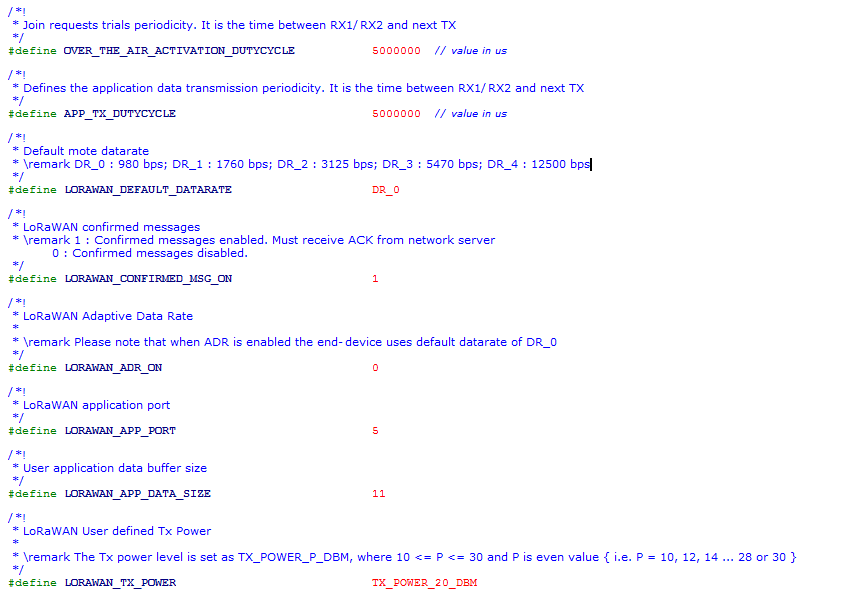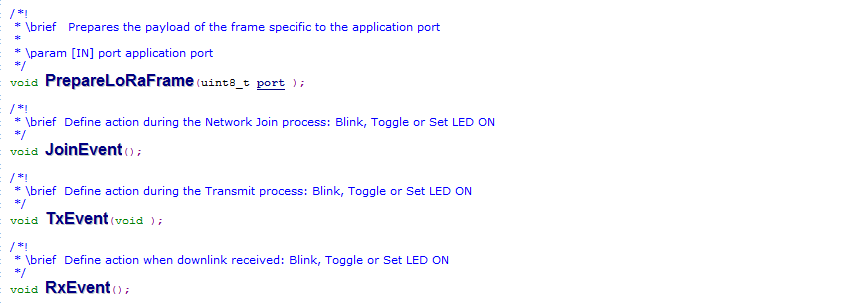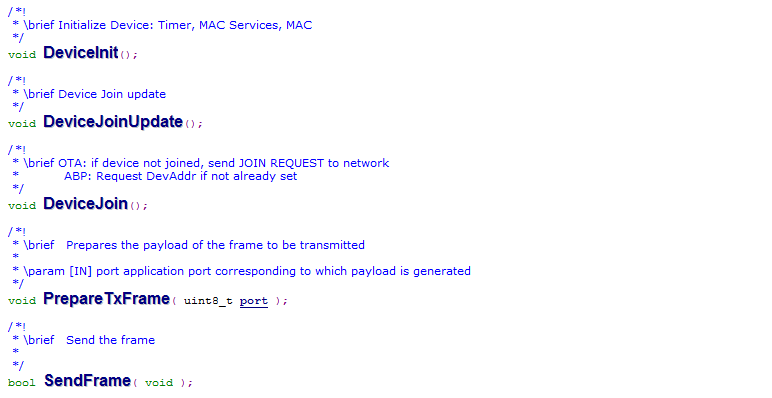Create Application using SX1272 + X-NUCLEO-IKS01A2
Dependencies: X_NUCLEO_IKS01A2 driver_mbed_TH02 mbed LoRaWAN-lib-v1_0_1 SX1272Lib
Fork of LoRaWAN-SX1272-Application-Demo by
LoRaWAN-NAMote72 Application Demo is a Class-A device example project using LoRaWAN-lib and SX1272Lib libraries.
Comissioning.h (LoRaWAN Network Configuration)
The end-device can be activated in one of the two ways:
Over the Air (OTA) activation can be enabled as shown in the figure below.

The end-device must be configured with the following parameters:
LORAWAN_DEVICE_EUI(8 Bytes) : Fist 3 Bytes is the Organizationally Unique Identifier (OUI) followed by 5 bytes of unique ID. If not defined by user, then the firmware automatically assigns one to the end-deviceLORAWAN_APPLICATION_EUI(8 Bytes)LORAWAN_APPLICATION_KEY(or DEVKEY) (16 Bytes)

Activation by Personalization (ABP) can be enabled as shown in the figure below.

The end-device must be configured with the following parameters:
LORAWAN_DEVICE_ADDRESS(4 Bytes) : If not defined by user, then the firmware automatically assigns one to the end-deviceLORAWAN_NWKSKEY(16 Bytes)LORAWAN_APPSKEY(16 Bytes)

Config.h (LoRaWAN Communication Parameters)
- Mode of Operation : Hybrid
If the end-device needs to be configured to operate over 8-channels, then
Hybrid Modeneeds to be enabled
- Mode of Operation : Frequency Hop
If the end-device needs to be configured to operate over 64-channels, then
Hybrid Modeneeds to be disabled
- Delay between successive JOIN REQUESTs :
The delay between successive Join Requests (until the end-device joins the network) can be configured using the parameter
OVER_THE_AIR_ACTIVATION_DUTYCYCLE
- Inter-Frame Delay :
One can change the delay between each frame transmission using
APP_TX_DUTYCYCLEIt is advisable thatAPP_TX_DUTYCYCLEis greater than or equal to 3sec.
- Data Rate :
The data rate can be configured as per LoRaWAN specification using the paramter
LORAWAN_DEFAULT_DATARATE. The range of values are DR_0, DR_1, DR_2, DR_3 and DR_4
- Confirmed/Unconfirmed Messages :
The uplink message or payload can be chosen to be confirmed or unconfirmed using the parameter
LORAWAN_CONFIRMED_MSG_ON. When set to 1, the transmitted messages need to be confirmed with anACKby the network server in the subsequent RX window. When set to 0, noACKis requested.
- ADR ON/OFF :
The ADR can be enabled or disabled using the parameter
LORAWAN_ADR_ON. When set to 1, ADR is enabled and disabled when set to 0.
- Application Port :
The application port can be set using parameter
LORAWAN_APP_PORT.
- Payload Length :
The lenght of the payload (in bytes) to be transmitted can be configured using
LORAWAN_APP_DATA_SIZE
- Transmit Power :
The transmit power can be configured using
LORAWAN_TX_POWER(LoRaMAC verifies if the set power is compliant with the LoRaWAN spec and FCC guidelines)

Main.cpp (Device State Machine)
The end-device state machine is defined.
- Initial State : Device is initialized.
- Join State : For OTA, Join Request is transmitted to the network until Join Accept is received by the end-device. Join event function is called that sets Red LED ON.
- Send State : Transmit payload frame is prepared. Tx event is called that blinks the Red LED indicating uplink transmission.
- Cycle State : Next packet transmission is scheduled
LoRaEventProc.cpp (Events and On-board Application)
Define events during Join, Tx & Rx. Prepare TX packet by appending with appropriate application data.

- PrepareLoRaFrame(uint8_t port ) :
Prepare LoRa payload frame with on-board application data such as GPS, Temperature, Battery, etc. LoRa.ApplicationCall(AppType ) calls application AppType defined in
LoRaApp.cpp. AppType is defined inLoRaApp.h

LoRaApp.cpp
User-defined applications such as GPS, Temp, Accelerometer, LED indications etc. Event based actions such as LED blink on Tx, LED toggle on downlink etc

LoRaDeviceStateProc.cpp
Process function calls corresponding to different Device states

LoRaMacLayerService.cpp
Define MAC Layer Services: MLME & MCPS
Diff: system/timer.h
- Revision:
- 0:6cc76d70e2a1
diff -r 000000000000 -r 6cc76d70e2a1 system/timer.h
--- /dev/null Thu Jan 01 00:00:00 1970 +0000
+++ b/system/timer.h Thu Apr 06 21:59:50 2017 +0000
@@ -0,0 +1,107 @@
+/*
+ / _____) _ | |
+( (____ _____ ____ _| |_ _____ ____| |__
+ \____ \| ___ | (_ _) ___ |/ ___) _ \
+ _____) ) ____| | | || |_| ____( (___| | | |
+(______/|_____)_|_|_| \__)_____)\____)_| |_|
+ (C)2013 Semtech
+
+Description: Timer objects and scheduling management
+
+License: Revised BSD License, see LICENSE.TXT file include in the project
+
+Maintainer: Miguel Luis and Gregory Cristian
+*/
+#ifndef __TIMER_H__
+#define __TIMER_H__
+
+#include "mbed.h"
+
+/*!
+ * \brief Timer object description
+ */
+typedef struct TimerEvent_s
+{
+ uint32_t value;
+ void ( *Callback )( void );
+ Ticker Timer;
+}TimerEvent_t;
+
+/*!
+ * \brief Timer time variable definition
+ */
+#ifndef TimerTime_t
+typedef uint32_t TimerTime_t;
+#endif
+
+/*!
+ * \brief Inializes the timer used to get current time.
+ *
+ * \remark Current time corresponds to the time since system startup
+ */
+void TimerTimeCounterInit( void );
+
+/*!
+ * \brief Initializes the timer object
+ *
+ * \remark TimerSetValue function must be called before starting the timer.
+ * this function initializes timestamp and reload value at 0.
+ *
+ * \param [IN] obj Structure containing the timer object parameters
+ * \param [IN] callback Function callback called at the end of the timeout
+ */
+void TimerInit( TimerEvent_t *obj, void ( *callback )( void ) );
+
+/*!
+ * \brief Starts and adds the timer object to the list of timer events
+ *
+ * \param [IN] obj Structure containing the timer object parameters
+ */
+void TimerStart( TimerEvent_t *obj );
+
+/*!
+ * \brief Stops and removes the timer object from the list of timer events
+ *
+ * \param [IN] obj Structure containing the timer object parameters
+ */
+void TimerStop( TimerEvent_t *obj );
+
+/*!
+ * \brief Resets the timer object
+ *
+ * \param [IN] obj Structure containing the timer object parameters
+ */
+void TimerReset( TimerEvent_t *obj );
+
+/*!
+ * \brief Set timer new timeout value
+ *
+ * \param [IN] obj Structure containing the timer object parameters
+ * \param [IN] value New timer timeout value
+ */
+void TimerSetValue( TimerEvent_t *obj, uint32_t value );
+
+/*!
+ * \brief Read the current time
+ *
+ * \retval time returns current time
+ */
+TimerTime_t TimerGetCurrentTime( void );
+
+/*!
+ * \brief Return the Time elapsed since a fix moment in Time
+ *
+ * \param [IN] savedTime fix moment in Time
+ * \retval time returns elapsed time
+ */
+TimerTime_t TimerGetElapsedTime( TimerTime_t savedTime );
+
+/*!
+ * \brief Return the Time elapsed since a fix moment in Time
+ *
+ * \param [IN] eventInFuture fix moment in the future
+ * \retval time returns difference between now and future event
+ */
+TimerTime_t TimerGetFutureTime( TimerTime_t eventInFuture );
+
+#endif // __TIMER_H__
